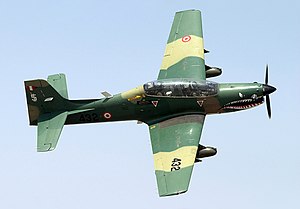Embraer EMB 312 Tucano
| EMB 312 Tucano | |
|---|---|
 |
|
| A Peruvian AT-27 | |
| Role | Trainer aircraft, with small light attack capabilities |
| National origin | Brazil |
| Manufacturer | Embraer |
| First flight | 16 August 1980 |
| Introduction | September 1983 |
| Status | Active |
| Primary users |
Brazilian Air Force French Air Force Argentine Air Force |
| Produced | 1980–1996 |
| Number built | 624 |
| Unit cost |
T-27: US$900,000 (1981)
|
| Variants | Short Tucano |
| Developed into | Embraer EMB 314 Super Tucano |
The Embraer EMB 312 Tucano (![]() pronunciation) is a low-wing tandem-seat single-turboprop basic trainer with counter-insurgency capability developed in Brazil. The Brazilian Air Force sponsored the EMB-312 project at the end of 1978. Design and development work began in 1979 on a low-cost, relatively simple new basic trainer with innovative features which eventually became the international standard for basic training aircraft. The prototype first flew in 1980, and initial production units were delivered in 1983.
pronunciation) is a low-wing tandem-seat single-turboprop basic trainer with counter-insurgency capability developed in Brazil. The Brazilian Air Force sponsored the EMB-312 project at the end of 1978. Design and development work began in 1979 on a low-cost, relatively simple new basic trainer with innovative features which eventually became the international standard for basic training aircraft. The prototype first flew in 1980, and initial production units were delivered in 1983.
Production was initially supported by a local order for 118 aircraft with options for an additional 50 units in October 1980. It was later matched by an Egyptian licence-produced purchase in 1993 and subsequently by an improved variant known as the Short Tucano, which was licence-produced in the United Kingdom. The Tucano made inroads into the military trainer arena and became one of Embraer's first international marketing successes. A total of 664 units were produced (504 by Embraer and 160 by Short Brothers), flying in sixteen air forces over five continents.
The Brazilian military government considered aircraft strategic equipment, and in an effort to reduce dependency from foreign companies, the state-owned Embraer was established in 1969. A production license to assemble the MB.326 was acquired in 1970 to familiarize the company with military design, and in 1973 the EMB-110 was introduced with a twin Pratt & Whitney PT6A engine that later would be shared with the Tucano.
...
Wikipedia
